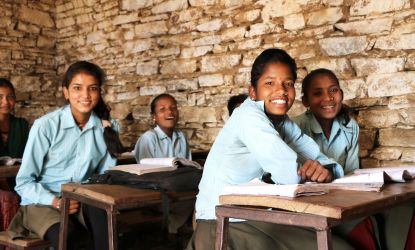The education of girls has a transformative effect on lives and communities. Find out about the barriers girls face going to school, the benefits of girls' education and what ActionAid is doing to make sure every girl gets the start in life that she deserves.
Why does ActionAid support girls’ education?
Around the world, nine million girls of primary school age will never start school or set foot in a classroom. This compares to about three million boys.1
All girls have the right to a quality education, and ActionAid knows that when girls get that education, their entire communities also benefit.
Women who have had an education tend to be healthier, earn higher incomes, have fewer children, marry at a later age and, if they choose to have children, their children are likely to be healthier and access an education themselves.
Together, all of these factors help women to lift themselves, their families and entire communities out of poverty.2
What difference does it make when women and girls are educated?
There is no dispute about the benefits of education, especially for girls.
- Better-educated women tend to earn more, have better jobs, and invest their earnings into their families. Every additional year of school a woman attends increases her wages by an average of 12 percent.
- Increasing girls’ education reduces infant and maternal mortality. Educated mothers have fewer pregnancies, are less likely to give birth as teenagers, and are better able to access the maternal healthcare they need.
- Increasing girls’ education reduces child marriage. Across 18 of the 20 countries with the highest prevalence of child marriage, girls with no education are up to six times more likely to marry as children than girls with a secondary education.
- Education helps give women the skills they need to take on leadership roles, including political positions. In those roles, they are much more likely to advocate for policies that benefit family and community life, like improved education and social services.6

Sia wants to become a lawyer, so she can fight injustice in her community
Jonathan Bundu/ActionAid
Scholarships for girls in Sierra Leone
In Sierra Leone, many parents struggle to pay school fees, and girls commonly drop out of school, making early marriage and teenage pregnancy more likely.
That’s why ActionAid launched a scholarship scheme to support girls through their primary and secondary education. 19-year-old Sia was one of the girls to benefit from the project.
She had faced dropping out of school, as her family couldn’t afford to keep her and her two brothers in school.
“I thank God I made it with flying colours and ActionAid came to my rescue,” she said.
Apart from the scholarship, ActionAid provided school uniforms, bags, pens, etc for all of us.”
ActionAid has also supported girls like Sia to become members of Violence against Women Clubs in school.
“This has helped us to understand our bodies and how we can protect ourselves from getting pregnant earlier, which would make us drop out of school,” she said.
How do we make sure girls stay in school?
ActionAid works with parents, teachers, children, civil society organisations and local authorities to make sure children have essentials like desks, books, food, drinking water and toilets at school.
We ensure that girls’ specific needs around access to menstrual products and advice on sexual reproductive health are met, so that they are able to go to school and stay there.
And we support Girls’ Clubs in schools, and in community spaces for girls not currently in school. These clubs offer a safe space for girls to learn about their rights, discuss issues and share experiences. In clubs girls also build their leadership skills so they can speak out in school, at home and in the community with confidence.
Supported by ActionAid, girls are leading their own positive change and challenging the harmful practices that impact girls, like child marriage and female genital mutilation (FGM).

Reducing school drop-out rates in Nepal
In Nepal, children frequently drop out of school early when their parents can’t afford the costs. The problem is worse for girls, who are often taken out of school for early marriage.
But ActionAid runs school enrollment campaigns every year in Nepal’s Doti region, working in the community and going door-to-door to ensure every school-age child is enrolled.
14-year-old Kamala had been taken out of school in order to take on caring responsibilities.
“I stayed home doing the chores and looking after my grandmother,” Kamala said. “It would make me sad seeing my friends passing by my house on the way to school.”
I also wanted to go to school along with my friends. I tried to convince my grandmother to allow me to go to school but every time she would say you are a girl, there is no point in going to school and I should learn to do the chores.”
Now, Kamala has been re-enrolled, and is happily managing her studies alongside helping with chores.
“When I finish with my studies, I want to be a doctor and help needy people,” she said.
Child Club: facilitating to bring school dropout children back to the school
Sabin Shrestha
Footnotes
- 1https://news.un.org/en/story/2019/09/1046272
- 2https://www.worldbank.org/en/topic/girlseducation
- 3https://news.un.org/en/story/2019/09/1046272
- 4https://www.unicef.org/education/girls-education
- 5https://www.unicef.org/education/girls-education
- 6https://www.malala.org/brookings-report/the-worlds-best-investment-girls-education
Page updated 14 February 2025
